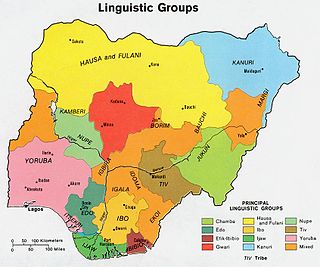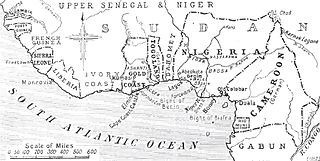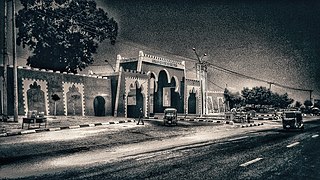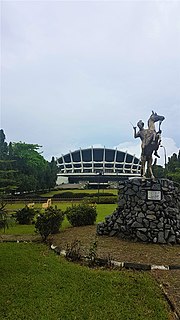Related Research Articles

The Sokoto Caliphate was a Sunni Muslim caliphate in West Africa. It was founded by Usman dan Fodio in 1804 during the Fulani jihads after defeating the Hausa Kingdoms in the Fulani War. The boundaries of the caliphate are part of present-day Cameroon, Burkina Faso, Niger, and Nigeria. It was dissolved when the British and Germans conquered the area in 1903 and annexed it into the newly established Northern Nigeria Protectorate and Kamerun respectively.

Southern Nigeria was a British protectorate in the coastal areas of modern-day Nigeria formed in 1900 from the union of the Niger Coast Protectorate with territories chartered by the Royal Niger Company below Lokoja on the Niger River.
The Battle of Tsuntua, fought in December 1804, was one of the largest battles of the Fulani War.
Oyinbo is a Yoruba word used to refer to early Caucasians. In the early 1470s, the first Portuguese berth in Eko, a Yorubaland, presently called Lagos. The word was first used by the Yoruba to describe the Portuguese they saw and later extend to all Europeans who arrived at their shore thereafter. Many years later, the word is used for anyone who is influenced by European tradition, customs, and culture, especially the Enslaved returnees. Nowadays, Oyinbo is generally used to refer to a person of European descent, African people perceived to not be culturally Yoruba or nowadays every other people of any race considered light-skinned. The word is generally understood by most Nigerians and many Africans.

Idia was the mother of Esigie, the Oba of Benin who ruled from 1504 to 1550. She played a significant role in the rise and reign of her son, being described as a great warrior who fought relentlessly before and during her son's reign as the Oba (king) of the Edo people. Queen Idia was instrumental in securing the title of Oba for her son Esigie following the death of his father Oba Ozolua. To that end, she raised an army to fight off his brother Arhuaran who was supposed to be the Oba by right and tradition but was subsequently defeated in battle. Esigie’s mother became the 17th Oba of Benin.

Ali Babba bin Bello was the fourth Sultan of the Sokoto Caliphate from 1842 to 1859. The Sokoto Caliphate leaders are partly Arabs and partly Fulani as stated by Abdullahi dan Fodio, brother of Usman dan Fodio who claimed that their family are part Fulani, and part Arabs, they claimed to descent from the Arabs through Uqba ibn Nafi who was an Arab Muslim of the Umayyad branch of the Quraysh, and hence, a member of the family of the Prophet, Uqba ibn Nafi allegedly married a Fulani woman called Bajjumangbu through which the Torodbe family of Usman dan Fodio descended. Caliph Muhammed Bello writing in his book Infaq al-Mansur claimed descent from Prophet Muhammad through his paternal grandmother's lineage called Hawwa, Alhaji Muhammadu Junaidu, Wazirin Sokoto, a scholar of Fulani history, restated the claims of Shaykh Abdullahi bin Fodio in respect of the Danfodio family been part Arabs and part Fulani, while Ahmadu Bello in his autobiography written after independence replicated Caliph's Muhammadu Bello claim of descent from the Arabs through Usman Danfodio's mother, the historical account indicates that the family of Shehu dan Fodio are partly Arabs and partly Fulani who culturally assimilated with the Hausas and can be described as Hausa-Fulani Arabs. Prior to the beginning of the 1804 Jihad the category Fulani was not important for the Torankawa (Torodbe), their literature reveals the ambivalence they had defining Torodbe-Fulani relationships. They adopted the language of the Fulbe and much ethos while maintaining a separate identity. The Toronkawa clan at first recruited members from all levels of Sūdānī society, particularly the poorer people. Toronkawa clerics included people whose origin was Fula, Wolof, Mande, Hausa and Berber. However, they spoke the Fula language, married into Fulbe families, and became the Fulbe scholarly caste. Ali bin Bello is known by a variety of different names in different sources, including: Ali bin Bello, Aliyu Babba, and Mai Cinaka.

This is a timeline of Nigerian history, comprising important legal and territorial changes and political events in Nigeria and tis predecessor states. To read about the background to these events, see History of Nigeria. See also the list of heads of state of Nigeria.

A Sabon Gari is a section of cities and town in Northern Nigeria South Central Niger and Northern Cameroon whose residents are not indigenous to Hausa lands.

Nigerians or the Nigerian people are citizens of Nigeria or people with ancestry from Nigeria. Nigeria is composed of various ethnic groups and cultures and the term Nigerian refers to a citizenship-based civic nationality. Nigerians derive from over 250 ethnic groups and languages. Though there are multiple ethnic groups in Nigeria, economic factors result in significant mobility of Nigerians of multiple ethnic and religious backgrounds to reside in territories in Nigeria that are outside their ethnic or religious background, resulting in the mixing of the various ethnic and religious groups, especially in Nigeria's cities. The English language is the lingua franca of Nigerians. 50% of Nigerians are Muslims and about 49.3% are Christians. These are the two major religions, according to statista.com, more than half of the Nigerian population is said to be Muslim, others are also practiced but are not as widely known as these two.

Toyin Omoyeni Falola is a Nigerian historian and professor of African Studies. Falola is a Fellow of the Historical Society of Nigeria and of the Nigerian Academy of Letters, and has served as the president of the African Studies Association. He is currently the Jacob and Frances Sanger Mossiker Chair in the Humanities at the University of Texas at Austin.
Muhammadu Attahiru I was the twelfth Sultan of the Sokoto Caliphate from October 1902 until March 15, 1903. He was the last independent Sultan of Sokoto before the Caliphate was taken over by the British.

The Adubi War was a conflict in June and July 1918 in the British Colony and Protectorate of Nigeria ostensibly because of the imposition of colonial taxation. Direct taxes were introduced by the colonial government along with existing forced labour obligations and fees. On 7 June, the British arrested 70 Egba chiefs and issued an ultimatum that resisters should lay down their arms, pay the taxes and obey the local leadership.
The following is a timeline of the history of the city of Kano, Nigeria.

Apollos Okwuchi Nwauwa is a Nigerian-born historian and professor of Africana Studies. He is currently the Director of Africana Studies, College of Arts and Sciences, Bowling Green State University, Bowling Green, Ohio. Nwauwa earned his Bachelor of Arts (B.A.) degree from the then Bendel State University Ekpoma, Edo State, Nigeria. He received his M.A. and Ph.D. in History at Dalhousie University, Halifax, Nova Scotia Canada, in 1989 and 1993 respectively. Nwauwa is a members of many learned societies and served as President of the Igbo Studies Association from 2010-2014. He is the current editor of OFO: Journal of Transatlantic Studies. Nwauwa is author and editor of many book and scholarly journal articles.

The Ancient Kano City Walls were ancient defensive walls built to protect the inhabitants of the ancient city of Kano. The wall was initially built from 1095 through 1134 and completed in the middle of the 14th century. The Ancient Kano City Walls were described as "the most impressive monument in West Africa".

Queen Amina Statue is an equestrian statue in honour of Queen Amina, an Hausa Warrior Queen of Zazzau. The sculpture was originally designed by Ben Ekanem in 1975 during the Second World Black and African Festival of Arts and Culture and was placed at the entrance of the National Arts Theatre in Lagos State. It was destroyed in 2005 due to weathering but was however re-designed in 2014 by an unsigned artist.

Oba Sir Musendiku Buraimoh Adeniji Adele II, KBE was the Oba (King) of Lagos from 1 October 1949 to 12 July 1964.
Oworo (Aworo) is a dialect of Yoruba spoken mainly in Oworo District of Lokoja LGA, Kogi State Nigeria. It is close to the Abinu (Bunu), Ikiri, Owe, Yagba and Ijumu dialects which are together known as Okun. The Okun dialects are mutually intelligible.

Chief Olufemi O. Vaughan is a Nigerian academic whose research and teaching focuses on African Political and Social History, African Politics, Diaspora Studies, African Migrations and Globalization, Religion and African States. He is currently the Alfred Sargent Lee '41 and Mary Ames Lee Professor of African Studies at Amherst College, Amherst, Massachusetts.
References
- ↑ "Moses Ochonu". as.vanderbilt.edu. Vanderbilt University. Retrieved 3 October 2017.
- ↑ "Moses Profile". linkedin.com. Linkedin. Retrieved 3 October 2017.
- ↑ "Author: Moses Ochonu". Ohio University Press. Retrieved 3 October 2017.
- ↑ "Professor Moses Ochonu". Public Radio International. Retrieved 14 January 2018.
- ↑ "Colonial Meltdown: Northern Nigeria in the Great Depression". The American Historical Association. Retrieved 1 September 2018.
- ↑ "Colonialism by Proxy Hausa Imperial Agents and Middle Belt Consciousness in Nigeria". Indiana University Press. Retrieved 1 September 2018.
- ↑ "Emirs in London: Subaltern Travel and Nigeria's Modernity". Indiana University Press. Retrieved 6 April 2022.